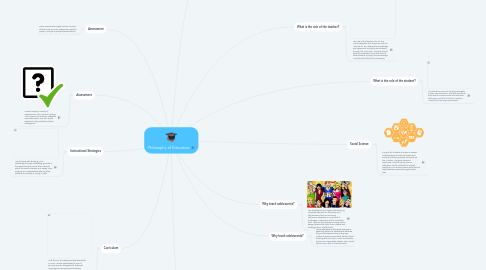Philosophy of Education
by RIchard C

1. Assessment
1.1. I would employ a variety of assessments in the hopes of getting a full measure of students' strengths and weaknesses. This also allows students to demonstrate multiple intelligences.
2. Assessment
2.1. Some assessments might include: surveys, double entry journals, webquests, research papers, and group projects/presentations.
3. Instructional Strategies
3.1. I would work with students' prior knowledge through scaffolding, give them the opportunity to pursue their interests within the social sciences, and assign a mix of group and independent work to allow students to develop a variety of skills.
4. Curriculum
4.1. With the aim of meeting content standards in mind, I would emphasize the use of primary sources alongside the textbook. Learning from primary sources allows students to derive their own interpretations and conclusions by practicing skills that rely upon critical thinking, such as determining the author's bias and intent, cross-examination, and synthesizing multiple sources.
5. Why teach adolescents?
5.1. I think education in the social sciences is especially salient for adolescents because they are fast approaching voting age. Historical awareness and well-honed critical thinking skills are vital in order for students to become responsible citizens, and I would like to have a part in that education.
6. How do adolescents learn?
6.1. I believe adolescents learn best by studying a curriculum that is tailored to their interests. Classes should be a balance of lecture, group activities, and independent work. The classroom environment should be inclusive and expectations should be high, but attainable.
7. Why teach adolescents?
7.1. The development of higher-order thinking, increased demand for autonomy, and self-discovery that occurs during adolescence presents a unique set of challenges in education at the secondary level. I believe this would encourage me to design lessons that catch their interest and challenge them intellectually.
8. Social Science
8.1. My goal for students is to gain a deeper understanding of historical events and trends that have produced the world we live in today. Alongside historical awareness, I believe social science education should cultivate the critical, analytical, and communicative skills that will help students succeed throughout their lives.
9. What is the role of the student?
9.1. The student's role is to actively participate in their own education. Students should do their best to communicate and work with both peers and their teacher to create a constructive learning environment.
10. What is the role of the teacher?
10.1. The role of the teacher is to act as a conduit between the classroom and the "real world" by utilizing their knowledge and experience as they guide students through the curriculum. Teachers should balance instructional time with time to allow students to apply their knowledge in activities that they find interesting.
11. What is the purpose of education?
11.1. The purpose of education should be to to develop students' emotional intelligence, critical thinking, practical skills, and democratic principles.


